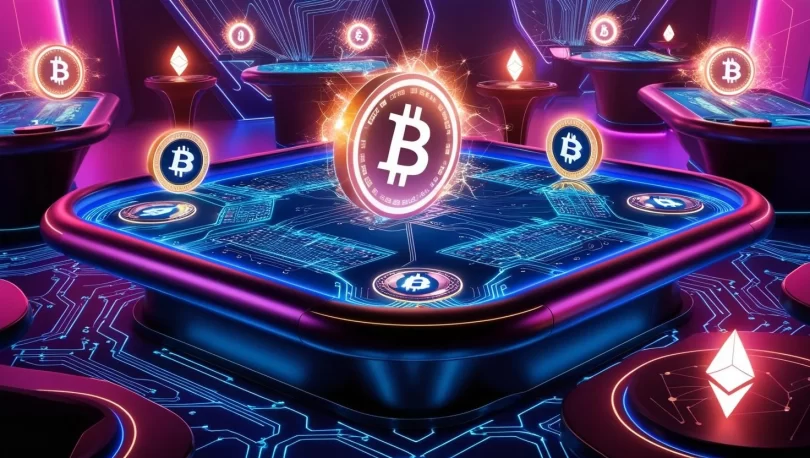In recent years, the online gambling industry has undergone a seismic shift, with decentralized casino platforms emerging as game-changers.
Unlike traditional online casinos, which rely on centralized servers and intermediaries, these platforms leverage blockchain technology to offer unparalleled transparency, security, and player control.
As cryptocurrencies gain mainstream traction, decentralized casinos are redefined as a way for players to engage with online gambling, blending cutting-edge tech with the thrill of gaming.
This post explores the meteoric rise of these platforms, their unique benefits, and why they’re poised to dominate the future of online gambling.
What Are Decentralized Casino Platforms?
Decentralized casino platforms operate on blockchain networks, utilizing smart contracts to automate and secure gambling processes. Unlike conventional casinos, where a central authority controls game outcomes and payouts, these platforms distribute operations across a network of nodes.
This eliminates the need for intermediaries, reduces operational costs, and ensures Provably Fair gaming. Players can verify game outcomes using cryptographic algorithms, fostering trust in an industry often plagued by skepticism.

These platforms typically accept cryptocurrencies like Bitcoin, Ethereum, or stablecoins, enabling fast, borderless transactions. With no central entity holding funds, players retain greater control over their assets, depositing and withdrawing directly from their crypto wallets.
According to a 2023 report by Fortune Business Insights, the global blockchain gaming market, including decentralized casinos, is projected to grow from USD 154.46 billion in 2023 to USD 614.91 billion in 2030 at a CAGR of 21.8%, highlighting their surging popularity.
Why Decentralized Casinos Are Gaining Traction
The appeal of decentralized casino platforms lies in their ability to address long-standing pain points in traditional online gambling.
Here are the key reasons behind their rise:
- Transparency and Fairness: Blockchain’s immutable ledger ensures that game results are tamper-proof. Players can independently verify outcomes, eliminating doubts about rigged games. This provably fair system builds trust and sets decentralized platforms apart.
- Enhanced Security: Centralized casinos are vulnerable to hacks and data breaches. In contrast, decentralized platforms use cryptographic encryption and distributed networks, making them nearly impervious to cyberattacks. Funds stored in personal wallets further reduce risks.
- Anonymity and Privacy: Many decentralized casinos require minimal personal information, appealing to players who value privacy. Players can gamble without sharing sensitive data using pseudonymous crypto wallets, a feature increasingly sought after in today’s digital landscape.
- Global Accessibility: Cryptocurrencies enable seamless cross-border transactions without delays, hefty fees, or currency conversion. This makes decentralized casinos ideal for players in regions with restrictive gambling laws or limited banking options.
Decentralized Casino Adoption Chart

Challenges and Considerations
Despite their promise, decentralized casinos face hurdles. Regulatory uncertainty remains a significant challenge, as governments worldwide grapple with how to oversee blockchain-based gambling.
Some jurisdictions may impose restrictions, impacting platform accessibility. Additionally, the learning curve for non-crypto-savvy players can be steep, requiring familiarity with wallets and blockchain transactions.
Scalability is another concern. High transaction volumes on popular blockchains like Ethereum can lead to network congestion, resulting in slower processing times and higher gas fees.
Emerging solutions like layer-2 scaling and newer blockchains (e.g., Solana) address these issues, but widespread adoption is still evolving.
The Future of Decentralized Casino Platforms
The trajectory of decentralized casinos points toward a bright future. Innovations like non-fungible tokens (NFTs) and decentralized finance (DeFi) integrations add new dimensions to these platforms.
For instance, some casinos now offer NFT-based rewards, allowing players to own unique digital assets tied to their gaming achievements. DeFi protocols enable staking and yield farming, letting players earn passive income alongside gambling.
Moreover, the rise of metaverse casinos blurs the lines between virtual reality and gambling. These immersive platforms combine blockchain’s security with engaging 3D environments, creating a next-level gaming experience.
As 5G and VR technology advance, decentralized casinos will become more interactive and accessible.
To stay ahead in this dynamic space, players should explore our guide on maximizing crypto casino rewards, which offers expert tips on leveraging bonuses and promotions.
Why Players Should Care
Decentralized casino platforms empower players with unprecedented control and fairness. By eliminating intermediaries, they reduce costs and enhance trust.
For crypto enthusiasts, these platforms align perfectly with the decentralization and financial sovereignty ethos. Even casual gamblers benefit from faster payouts, lower fees, and a transparent gaming environment.
Staying informed is crucial as the industry evolves. Platforms prioritizing user-centric innovation, such as integrating AI for personalized gaming or adopting eco-friendly blockchains, will likely lead the pack.
The rise of decentralized casinos isn’t just a trend—it’s a revolution reshaping online gambling for the better.











